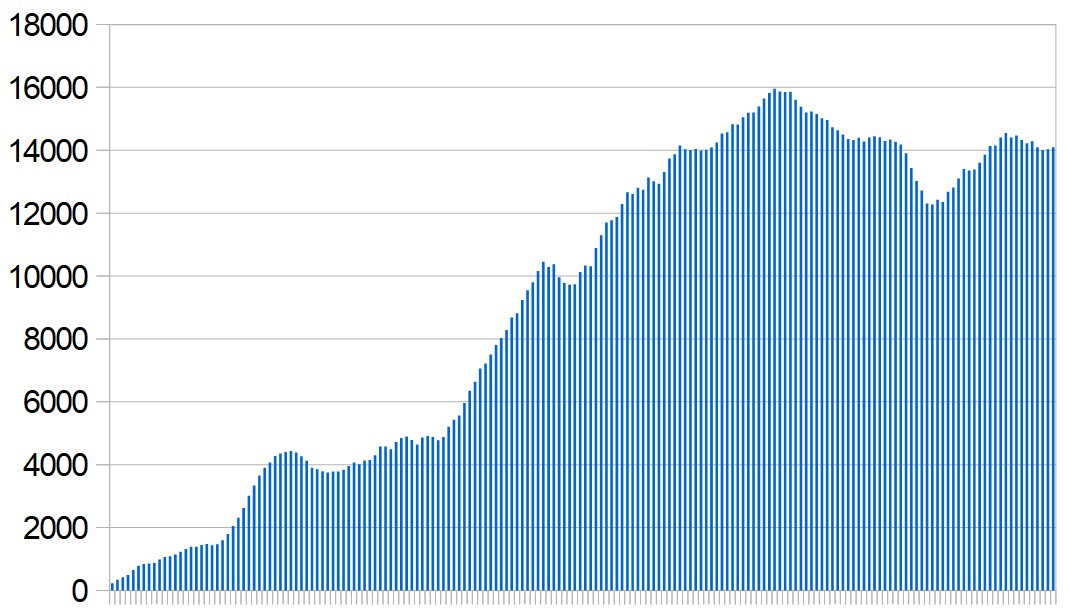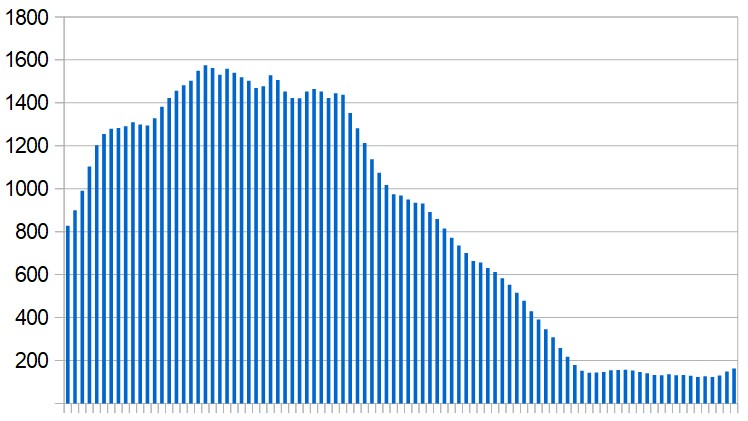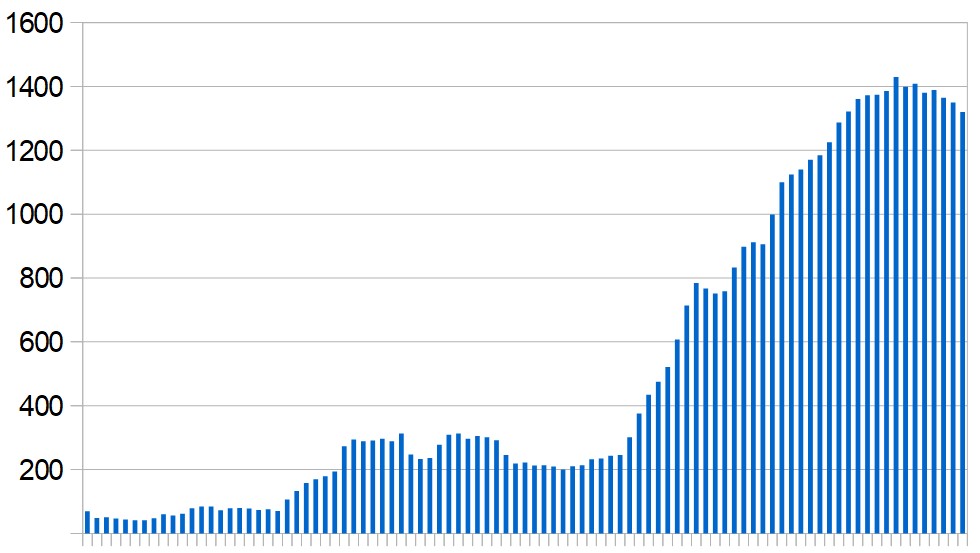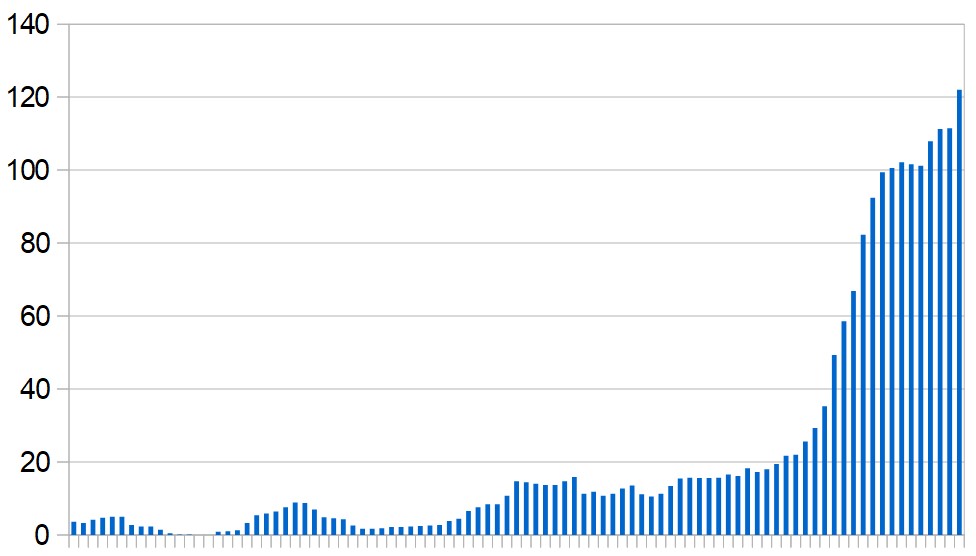Week ending 29 August 2020
REGIONAL OVERVIEW
 |
New Covid-19 infections in the Middle East and North Africa remain fairly constant at around 14,000 a day, according to official figures. Among the 20 countries monitored, ten recorded an increase this week and ten recorded a decrease.
Iraq continues to report the highest number of new infections in the region.
The main problem, almost everywhere in the region, is non-compliance with preventive measures. This has wider implications for the relationship between regimes and the people they govern – which I discussed in an article published by Culturico this week. Some key points:
● Arab governments have mostly failed to convince the public of the need for restrictions and have relied too heavily on threats of punishment for violators. Several Gulf states have developed highly intrusive methods of electronic surveillance to monitor non-compliance with lockdowns and quarantine.
● In some countries people with Covid-19 symptoms are reluctant to come forward, either because of social stigma or distrust of the health services. In some places families don't want the virus mentioned on death certificates because that can cause problems with burial of the body.
● The relationship between regimes and citizens is likely to be tested further as the economic consequences of the pandemic become more apparent. If regimes can't convince the public of the need for basic precautions against the virus, how will they convince them of the need for further sacrifices in the economic aftermath?
Detailed statistics for the region, based on official figures, can be found in this spreadsheet.
Previous situation reports:
August 22; August 15; August 8; August 1; July 25; July 18; July 11; July 4; June 27; June 20.
ALGERIA
Algeria's outbreak peaked towards the end of July when more than 600 new cases were being recorded each day. Since then the trend has been downwards, with new cases averaging 391 a day during the past week according to official figures.
For more information see: Covid-19 in Algeria
Confirmed cases: 43,403
New cases in past week: 2,736
Active cases: 11,484
Deaths: 1,483
Tests carried out: (unknown)
BAHRAIN
Bahrain has almost 30,000 known cases per million inhabitants. This makes it the world's third most infected country after Qatar and French Guiana. However, Bahrain is also one of the world leaders in Covid-19 testing. So far, almost 60% of its 1.7 million population have been tested.
The daily total of new cases fluctuates but Bahrain's epidemic appears to be subsiding gradually. The number of people reported to be currently infected is 3,164 compared with 5,700 at the peak in mid-June.
Cafes and restaurants remain closed but the authorities have announced plans for a phased reopening in September.
For more information see: Covid-19 in Bahrain
Confirmed cases: 51,113
New cases in past week: 2,452
Active cases: 3,164
Deaths: 189
Tests carried out: 1 million
EGYPT
 |
New cases peaked in June and have fallen sharply during the past few weeks, according to official figures. This week's average was 162 cases a day compared with almost 1,600 at the peak.
However, health minister Hala Zayed warned this week that "a false sense of security" may lead citizens to think the epidemic is over. A cabinet meeting on Wednesday discussed "the expected scenarios" if a second wave of infections occurs.
The education ministry says international schools in Egypt can reopen in mid-September. The plans, which include online teaching and reduced physical attendance at schools, are discussed in an article for Ahram Weekly, along with safety concerns.
A paper published by the Arab Reform Initiative argues that Covid-19 has further exposed Egypt's fragility. It says: "Egypt is now back to square one, in a situation broadly similar to that before the 2011 revolution: stable on the surface, but with deep structural problems and simmering social grievances." It identifies three main areas of vulnerability and says a shift is needed towards "greater openness in markets as well as politics".
For more information see: Covid-19 in Egypt
Confirmed cases: 98,285
New cases in past week: 1,137
Active cases: 22,504
Deaths: 5,362
Tests carried out: 135,000
IRAN
Iran was the first country in the region to be seriously affected by the virus and its epidemic shows no sign of abating. Government figures show an initial wave of infections which peaked at the end of March. It subsided during April, briefly dipping below 1,000 new cases per day but then rose to another peak in the first week of June.
New cases this week averaged 2,164 a day – a small decrease since the previous week.
Iran continues to report more coronavirus-related deaths than any other country in the region. A further 873 deaths have been recorded during the past week.
Confirmed cases: 369,911
New cases in past week: 15,147
Active cases: 30,392
Deaths: 21,249
Tests carried out: 3.2 million
IRAQ
Iraq is currently recording more new infections than any other country in the region, though the number has declined slightly this week with an average of 3,790 a day.
Iraq's official figures are widely believed to understate the scale of the epidemic. Many cases go unreported because of social stigma. Compliance with preventive measures appears to be low and health services are inadequate.
The health ministry announced this week that it has treated some 15,000 Covid-19 patients with plasma extracted from the blood of people who have recovered from Covid-19. This may be having some effect on the death toll which averaged 125 a day this week compared with a daily average of more than 200 earlier this month.
There are reports that the blood plasma of people who have recovered is being traded in Iraq at extortionate prices. One man paid $1,500 for a litre of plasma on behalf of a relative who later died.
For more information see: Covid-19 in Iraq
Confirmed cases: 223,612
New cases in past week: 26,527
Active cases: 51,924
Deaths: 6,814
Tests carried out: 1.5 million
ISRAEL
After coming close to bringing the epidemic under control, Israel has been hit by a second wave much larger than the first. The first wave peaked at around 600 new cases a day in early April. Efforts to control it were intially successful and by the second half of May new cases had dropped to about 15 a day.
However, the virus surged back when lockdown restrictions were lifted and by the end of July new cases were averaging almost 1,800 a day.
The number of new cases is currently lower than that but this week's average of 1,612 a day is slightly more than in the previous week.
For more information see: Covid-19 in Israel
Confirmed cases: 112,000
New cases in past week: 11,284
Active cases: 20,055
Deaths: 894
Tests carried out: 2.2 million
JORDAN
Until recently Jordan appeared to be the most successful Arab country in controlling the virus. Although it continued to intercept new cases among people arriving from abroad, transmission within the country had virtually ceased. Since then, however, there has been a spate of locally-occurring cases and they now account for almost all the newly-detected infections.
Although Jordan's outbreak is still small, with fewer than 500 active cases, Friday's total of 68 new infections was the highest daily figure so far.
The authorities are trying to persuade more people to use the contact-tracking Aman app which has so far been dowloaded by less than 10% of the population. The app alerts users if they have been in contact with someone who is known to carry the virus. The app stores location data for two weeks, which means it can also alert users retrospectively if one of their contacts is subsequently diagnosed.
Downloading the app is described as "a moral obligation" but there is some resistance from the public. The government has called on all employers to ensure that their workers use it.
For more information see: Covid-19 in Jordan
Confirmed cases: 1,869
New cases in past week: 337
Active cases: 487
Deaths: 15
Tests carried out: 800,000
KUWAIT
New infections peaked in late May at just over 1,000 cases a day. The numbers have dropped back substantially since then and this week's average was 616 a day.
The government has announced that the night curfew will be lifted on August 30. Restrictions on large gatherings such as weddings and funerals will continue.
As a result of the economic downturn caused by the pandemic and low oil prices Kuwait is planning to expel 360,000 foreigners though as yet there is no timetable for their departure.
For more information see: Covid-19 in Kuwait
Confirmed cases: 83,578
New cases in past week: 4,309
Active cases: 7,733
Deaths: 525
Tests carried out: 607,000
LEBANON
Political and economic turmoil, plus the devastating explosion in Beirut on August 4, have diverted attention from the coronavirus. Although Lebanon's outbreak is still relatively small, infections have surged during the past month. New cases this week averaged 576 a day – more than three times the level at the end of July.
A new partial lockdown began last week but the restrictions were relaxed almost immediately following objections from restaurants and cafes, among others. This means infections are likely to continue increasing and the relaxation has been strongly criticised on Twitter by Firass Abiad, director of the Rafik Hariri University Hospital in Beirut.
For more information see: Covid-19 in Lebanon
Confirmed cases: 15,613
New cases in past week: 4,033
Active cases: 11,205
Deaths: 148
Tests carried out: 502,000
LIBYA
Libya is in its ninth year of internal conflict. The UN-backed Government of National Unity in Tripoli is challenged by Field Marshall Haftar's forces based in the east of the country. There are also numerous militias. This leaves the country ill-equipped to cope with a major epidemic.
Growing levels of insecurity, political fragmentation and weak governance have led to a deterioration of basic services, particularly in the health system. At least 27 health facilities have been damaged or closed by fighting and some have been attacked directly. There are 870,000 people – refugees, asylum seekers and displaced persons – who the UN regards as especially vulnerable.
The World Health Organisation (WHO), which previously described the coronavirus situation in Libya as "clusters of cases", has now revised its status to "community transmission". In other words, the situation has worsened
Investigations by the National Centre for Disease Control (NCDC) have concluded that most infections are the result of people not practising social distancing.
For more information see: Covid-19 in Libya
Confirmed cases: 12,629
New cases in past week: 2,508
Active cases: 11,093
Deaths: 226
Tests carried out: 101,000
MOROCCO
 |
By early June a strict lockdown had reduced new cases in Morocco to around 40 a day. Since then, though, there has been a major setback and new cases this week have been averaging 1,320 a day.
For more information see: Covid-19 in Morocco
Confirmed cases: 58,489
New cases in past week: 9,242
Active cases: 14,388
Deaths: 1,052
Tests carried out: 1.9 million
OMAN
Infections peaked in mid-July with just under 1,600 cases a day and are now on a mostly downward path. New cases this week averaged 177 a day.
The health ministry has provided some demographic information about Covid-19 infections in the sultanate:
Omanis: 51,589
Non-Omanis 32,180
Male: 61,382
Female: 22,387
Under 5 years old: 3,053
Aged 5-14: 2,659
Aged 15-59: 73,944
Aged over 60: 4,133
For more information see: Covid-19 in Oman
Confirmed cases: 85,005
New cases in past week: 1,236
Active cases: 4,747
Deaths: 650
Tests carried out: 309,000
PALESTINE
Seventy-five cases of Covid-19 have been reported in Gaza this week and the Hamas authorities have imposed a lockdown. Gaza is densely populated, with limited medical facilities, and a major outbreak could be disastrous. Before this week, however, it had been relatively virus-free with only 117 cases recorded since the start of the pandemic.
Meanwhile, the upward trend in the West Bank continues, with 2,630 new cases reported this week. Hebron is the most seriously affected area, with 12,241 confirmed cases – more than half the total. Many of the West Bank infections are attributed to people ignoring the rules for social distancing, which the authorities have difficulty enforcing. The health ministry says more than 30% of cases are the result of Palestinians travelling to and from work in Israel which is in the second wave of its epidemic.
For more information see: Covid-19 in Palestine
Confirmed cases: 28,110 (West Bank 18,923, Gaza 192, East Jerusalem 8,995)
New cases in past week: 3,712
Active cases: 8,967
Deaths: 160
Tests carried out: 263,000
QATAR
In population terms Qatar has more known cases than any other country – 42,000 per million inhabitants. Migrant workers have been disproportionately affected. Qatar's epidemic reached a peak in the first week of June but infections have fallen since then. New cases this week averaged 245 a day – well below the peak of more than 1,800 a day.
For more information see: Covid-19 in Qatar
Confirmed cases: 118,196
New cases in past week: 1,715
Active cases: 2,983
Deaths: 196
Tests carried out: 614,000
SAUDI ARABIA
Saudi Arabia has the largest number of recorded cases among the Arab countries. New infections reached an initial peak in the fourth week of May, then dropped back slightly before rising to a higher peak in the third week of June. Since then, though, there has been a substantial improvement.
Numbers of new cases are still relatively large, though this week's average of 1,105 a day is the lowest since April.
For more information see: Covid-19 in Saudi Arabia
Confirmed cases: 312,924
New cases in past week: 7,738
Active cases: 21,708
Deaths: 3,813
Tests carried out: 4.8 million
SUDAN
The coronavirus struck Sudan in the midst of a political transition following a popular uprising against the regime of President Bashir and the country is ill-equipped to cope with a major epidemic. Testing is very limited and official figures don't reflect the full scale of the outbreak.
For more information see: Covid-19 in Sudan
Confirmed cases: 13,082
New cases in past week: 459
Active cases: 5,656
Deaths: 823
Tests carried out: (unknown)
SYRIA
According to official figures only 2,563 cases have been recorded in areas controlled by the Assad regime – though more than two-thirds of those have occurred this month.
The authorities give very little information and this lack of transparency fuels suspicions that many cases are being concealed. There is also some evidence that people with Covid-19 symptoms are reluctant to contact the authorities.
While there are plenty of signs that the true figures are higher than those issued by the regime, it is unclear how high they really are. For further discussion see Foreign Policy and the Syrian Observer.
Fears have been raised about north-western and north-eastern parts of the country which are outside the regime's control. Millions of displaced people are living in those areas and health services are often rudimentary. So far, 400 cases have been confirmed in the north-east and 61 in the north-west according to Syria in Context, a subscription website.
For more information see: Covid-19 in Syria
The following figures relate to regime-controlled areas only:
Confirmed cases: 2,563
New cases in past week: 490
Active cases: 1,876
Deaths: 103
Tests carried out: (unknown)
TUNISIA
 |
In June, Tunisia appeared to be almost free of the virus and began promoting itself as a safe holiday destination. Since then, though, new infections have been increasing.
Tunisia's outbreak remains small but more than 100 new cases have been recorded every day this week.
For more information see: Covid-19 in Tunisia
Confirmed cases: 3,461
New cases in past week: 854
Active cases: 1,865
Deaths: 74
Tests carried out: 137,000
UNITED ARAB EMIRATES
The UAE's epidemic peaked in the last week of May when new infections were running at more than 900 a day. Numbers of new cases are now considerably lower, though this week's average of 387 a day is the highest since mid-July.
The UAE has carried out more tests per head of population than any other Arab country and ranks tenth worldwide in terms of tests carried out.
For more information see: Covid-19 in the UAE
Confirmed cases: 68,901
New cases in past week: 2,708
Active cases: 8,661
Deaths: 379
Tests carried out: 6.8 million
YEMEN
Because of the ongoing war, Yemen already faced a humanitarian crisis before the coronavirus arrived. Millions are malnourished and vulnerable to disease, and health services are inadequate. Official figures grossly understate the severity of the epidemic. Cholera is also prevalent.
For more information see: Covid-19 in Yemen
Confirmed cases: 1,947
New cases in past week: 37
Active cases: 273
Deaths: 564
Tests carried out: (unknown)

 RSS Feed
RSS Feed
